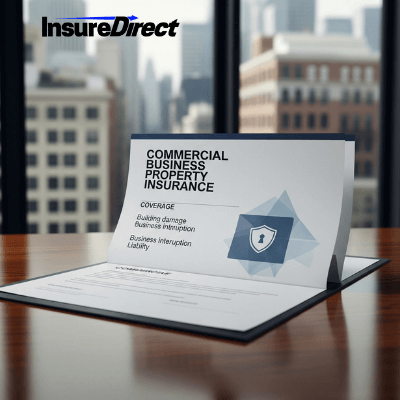I’ll be honest. For years, I never thought too much about property insurance. My office looked solid, my computers ran fine, and the shelves stayed full of stock. What could go wrong, right? Except… that’s what every business owner thinks, until it doesn’t.
So, commercial business property insurance—what even is that? Simple, not complicated: it’s the kind of policy that covers the “stuff” your business owns. Buildings, the machines, the chairs you sit on, even the sign outside the store. If it gets burned, stolen, smashed, whatever, there’s a safety net instead of your bank account going empty overnight.
I once asked an older shop owner what he regretted not buying sooner. He didn’t hesitate: insurance for his building. He told me about a fire years back—flames ate half the warehouse—and he had to rebuild everything from scratch. No payout, no policy, just loss. Honestly, I didn’t sleep well that night.
Why It Matters More Than You Think
Maybe you’re like me, running lean margins, worrying about staff wages and rent more than insurance. But think of these real scenes:
A thief breaking the window at 2am and hauling away expensive gear.
A sudden storm ripping a roof apart.
Smoke creeping through an office and frying equipment beyond repair.
Those things don’t just cost money—they stop operations. Customers go elsewhere. Cash flow dies. If you’re insured, you recover quicker. Without? You pay out of pocket, and it hurts bad.
What’s Usually Inside the Coverage
Most commercial property insurance looks similar at the core, though every policy has its own twist. Common things it usually protects:
Fire & smoke. Still the number one danger, and not just in old buildings.
Theft or vandal. Someone spray-painting your storefront? Yeah, that’s included.
Weather events. Some storms yes, but earthquakes and floods often excluded unless you pay extra.
Equipment breakdown. A broken furnace in January or your server frying on a Monday morning.
Income interruption. If your shop shuts down while you fix damage, some policies help replace the lost sales.
I didn’t even know about that last one until an agent pointed it out—seemed like a lifesaver if things went south.
Replacement Cost vs. Cash Value
Here’s where people get tripped. The insurance may pay you back two ways:
Replacement Cost: you get enough money to buy new stuff, not old junk.
Actual Cash Value: they subtract depreciation, so you end up with less.
Guess which one is cheaper? The second. Guess which one actually helps when you need to reopen fast? The first. I’d never gamble on ACV again if I had the choice.
Why Premiums Aren’t the Same for Everyone
My buddy runs a bakery in a busy city street—his premium is twice mine, even though his space is smaller. Why? Insurers check a laundry list of things:
Location (crime rates, storms, flood zones).
What kind of building materials you’ve got.
Age of the structure.
How much inventory or pricey machines are inside.
What industry you’re in (restaurant risk ≠ law office risk).
So don’t expect your price to match your neighbor’s. Insurers look at every detail.
Do You Really Need It?
If you own any space, yes. If you lease, probably still yes. It doesn’t matter if it’s a cafe, retail shop, accountant office, warehouse, even a home-based business with stacks of equipment. Fun fact—most home insurance won’t cover business losses. I found that out after asking about my laptops and printers at home. They flat-out told me: nope, get a separate policy.
How I Picked My Policy
Here’s what worked for me when I finally signed up:
I made a rough list of everything physical my company used. Desks, shelves, laptops, routers, tools—you name it.
Then I asked the broker about exclusions. (Always sneaky—things like floods, earthquakes, cyber stuff. If you don’t ask, you won’t know).
I compared different providers. Some offered cheaper rates but terrible customer service reviews. Not worth the headache.
Bundled policies saved me money. I got a Business Owner’s Policy which wrapped property + liability together.
One thing I learned: never underinsure. It looks cheaper at first but backfires when you try to claim.
How to Cut the Costs Without Cutting Protection
Insurance feels expensive, sure, but you can lower premiums smartly. Some ideas I tried:
Installing a better alarm system.
Adding fire sprinklers.
Raising my deductible a little (not too high, though).
Sticking with one insurer for multiple policies.
The insurer literally dropped my bill after I showed them receipts for new fire detectors. They like businesses that take risk reduction seriously.
Wrapping This Up
If you’re still on the fence, let me tell you: commercial business property insurance isn’t a luxury—it’s survival. Fires don’t warn you, thieves don’t ask permission, storms don’t check your schedule. One accident can erase ten years of work.
For me, the peace of mind is worth it. I sleep easier knowing if the worst happens, I’m not starting from zero again. And in business, that’s half the battle—staying alive long enough to grow.
Looking for the best insurance coverage? InsureDirect has you covered. Getting a home insurance quote is fast and hassle-free. Reach out online or contact our corporate office:
InsureDirect.com
Corporate Home Office
618 South Broad Street
Lansdale, Pennsylvania 19446
Email: contact@insuredirect.com
Phone: (800) 807-0762 ext. 602
Protect your home and enjoy peace of mind with reliable coverage from InsureDirect. Your home deserves top-quality protection.

